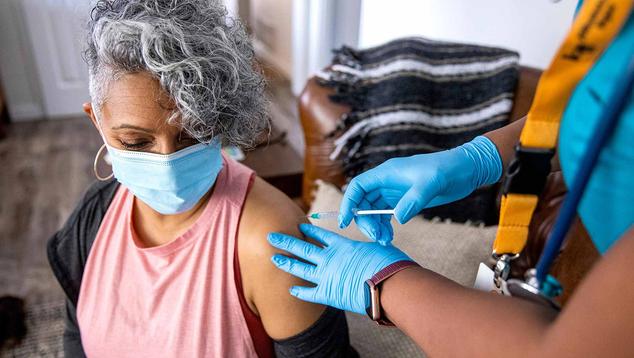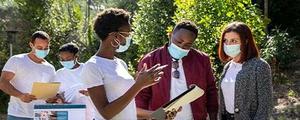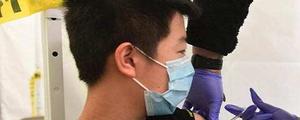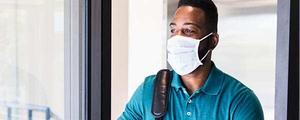Story Highlights
- 18% would not agree to be vaccinated and are unlikely to change mind
- Reasons given for not wanting to get vaccinated vary
- Parents' vaccination intentions for children stable
WASHINGTON, D.C. -- Just under one in five U.S. adults, 18%, can be described as vaccine-resistant. These Americans say they would not agree to be vaccinated if a COVID-19 vaccine were available to them right now at no cost and that they are unlikely to change their mind about it. The percentage holding these views has been stable in recent months.
Another 5% of Americans would not agree to be vaccinated but say they are at least somewhat likely to change their mind.
The remainder of U.S. adults either report having already been vaccinated (69%) or say they plan to be (8%). The vaccinated group is up from 64% in May but shows little change from the 68% recorded in June.
| May 18-23, 2021 | Jun 14-20, 2021 | Jul 19-26, 2021 | |
|---|---|---|---|
| % | % | % | |
| Already vaccinated | 64 | 68 | 69 |
| Plan to get vaccinated | 12 | 8 | 8 |
| Would not agree to be vaccinated; very/somewhat likely to change mind | 5 | 4 | 5 |
| Would not agree to be vaccinated; not likely to change mind | 19 | 20 | 18 |
| Gallup Panel | |||
These results are based on Gallup's latest COVID-19 tracking survey, conducted July 19-26, and align with the latest vaccination figures from the U.S. Centers for Disease Control and Prevention. The CDC reports that, as of Aug. 2, 70% of U.S. adults had received at least one COVID-19 vaccine dose.
The survey was conducted amid a rise in U.S. coronavirus cases but before the CDC called for renewed precautionary measures, aimed at both vaccinated and unvaccinated people in areas with high caseloads. The rise in COVID-19 infections has largely occurred among unvaccinated Americans.
During this time, Americans' assessment of the COVID-19 situation has turned negative, and they are less confident they can protect themselves from the virus. Nearly two-thirds are worried about new variants of the virus spreading, including the delta variant that is now the dominant strain in the U.S.
Consistent with those attitudes, Americans are now less satisfied with the way the vaccination process is going in the U.S. Sixty-two percent are satisfied, down from 77% in the prior survey in June. The current figure is the lowest Gallup has measured since February, early in the rollout process.

Line graph. 62% of Americans are currently satisfied with how the vaccination process is going in the United States, down from 77% in June.
It is unclear if declining satisfaction stems from the slowing vaccination pace, the reported breakthrough COVID-19 infections in vaccinated Americans or the continued resistance of many Americans to being vaccinated.
Varied Reasons for Not Wanting to Be Vaccinated
Americans not planning to get vaccinated generally cite three main reasons: They want to wait to confirm the vaccine is safe or gets full FDA approval (18%), they have already had COVID-19 and have antibodies (18%), or they don't trust vaccines in general (18%).
Slightly fewer Americans not planning to get vaccinated express concern about the timeline for developing the vaccine (14%), do not believe they would face serious health effects from the coronavirus (13%) or are concerned about an adverse allergic reaction (12%).
| % Choosing | |
|---|---|
| I want to wait to confirm it is safe/wait for full FDA approval | 18 |
| I don't trust vaccines generally | 18 |
| I have already had the coronavirus/have antibodies | 18 |
| I am concerned about the timeline for developing the vaccine | 14 |
| I don't think I would face serious health effects from the coronavirus | 13 |
| I am concerned about my possible allergies/allergic reaction to the vaccine | 12 |
| I want to wait to see how effective it is | 7 |
| Based on U.S. adults who would not agree to receive a COVID-19 vaccine | |
| Gallup Panel, July 19-26, 2021 | |
The current figures reveal two notable shifts from the previous measure of this question in April. More now (18%) than in the spring (10%) say they have already had the virus and therefore have COVID-19 antibodies. Meanwhile, the percentage who mention they would not face serious health effects from the virus has declined, from 21% to 13%.
Parents' Vaccine Intentions for Children Holding Steady
While the current vaccination rate among adults is lower than public health officials may want to see, it appears the vaccination rate of children is unlikely to reach the level it is at for adults. This is according to parents' reports of the vaccination status of their eligible children and their intentions for vaccinating their younger kids.
- Six in 10 parents of children aged 16 to 18 say that their child has been vaccinated (50%) or that they plan to have them vaccinated (10%).
- Slightly fewer parents of children aged 12 to 15, totaling 53%, say that their child has been vaccinated (36%) or that they plan to have them vaccinated (17%).
- Also, 54% of parents of children under age 12 say they would plan to get their child vaccinated if a vaccine for younger children were approved.
The percentages of parents who have gotten or intend to get their children vaccinated have been stable since Gallup first asked the question in May.
The public as a whole generally favors requiring middle and high school students to be vaccinated, but less than half of parents support such a requirement.
This gap may result from parents' attitudes toward COVID-19 vaccinations in general and their willingness to get themselves vaccinated as much as from their concerns about the vaccine's safety in children. Currently, 58% of parents of children under 18 have been vaccinated, compared with 73% of non-parents. Another 10% of parents say they would get vaccinated, while 33% say they would not.
Bottom Line
The vaccination pace in the U.S. has slowed considerably during the summer, and it was not until Aug. 2 that 70% of U.S. adults had received at least one dose of the COVID-19 vaccine, which is the goal President Joe Biden hoped to reach by July 4.
The slower pace is largely owed to the reluctance of many Americans to get vaccinated rather than the availability of the vaccine.
In recent days, however, the daily U.S. vaccination rate has begun to increase, particularly in areas with lower proportions of people vaccinated. This could be a response to efforts by government and public health officials to raise awareness about the rising cases in many of those areas brought on by the more contagious delta variant.
The Biden administration is encouraging states to offer incentives to get people vaccinated, and some are hopeful that full FDA approval of the vaccines is coming soon and will be enough to convince others to get vaccinated.
To stay up to date with the latest Gallup News insights and updates, follow us on Twitter.
Learn more about how the Gallup Panel works.




